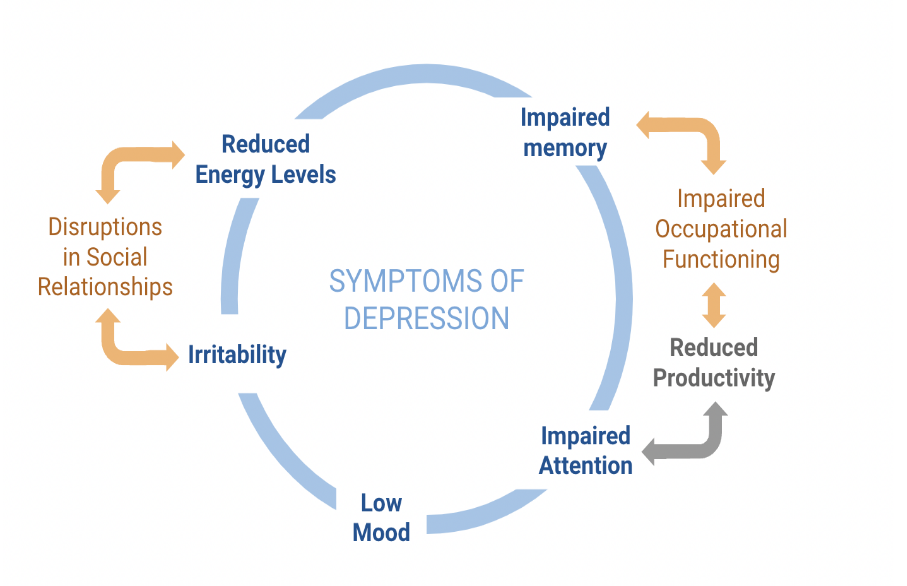We often think about depression and anxiety in terms of symptom severity. In this week’s blog, we explore the role functional impairment plays in those disorders, as it tends to be overlooked.
What is functional impairment?
Functional impairment relates to what is more commonly known as a disability. Whilst the latter term is usually associated with conditions limiting someone’s physical functioning, functional impairment is characteristic of conditions such as depression, anxiety, or schizophrenia. It can be defined as an individual’s inability to perform day-to-day tasks due to a given condition (Üstün et al., 2009). Concretely, this can include disruptions in social relationships, leisure activities, employment, home responsibilities and family life.
To illustrate, the diagram below shows how the symptoms of a fictious patient with a diagnosis of depression may be related to their functional impairment. This example includes various options taken from McKnight et al. (2009) and does not represent any causal relationships or the general experience of impairment, which can significantly differ between individuals.
What is the link between functional impairment and symptom severity?
Whether functional impairment causes or is caused by a given condition is an open question and is likely to depend on individual cases and conditions. However, it seems relatively clear that it is linked to both anxiety and depression. At the same time, we know that a decrease in functional impairment does not necessarily imply a decrease in symptom severity (Skelton et al., 2021). This means that a patient can have few symptoms of anxiety yet still be unable to maintain their social relationships or fulfil their responsibilities at home. 
What does this mean for treatment?
This difference is relevant to the way we define the recovery of both anxiety and depression. Should the patient who has few anxiety symptoms but is still unable to function well at home be considered as recovered or not? Typically, clinicians use scores on standardised measures to determine the severity of someone’s condition. However, these measures focus mainly on symptom severity rather than functional impairment (Kamenov et al., 2015). As a result, sometimes a patient is currently considered better whilst retaining a high level of functional impairment. This is true even though many patients with depression have said that a return to their usual level in terms of functioning was one of the most important factors determining their recovery (Zimmerman et al., 2006). In recent years, researchers and clinicians have begun to consider how to incorporate functional impairment into measures of treatment outcome, but much remains to be understood.
Why is it important to think about functional impairment?
Depressive and anxiety disorders are leading factors contributing to the global burden of disease (GBD 2019 Mental Disorders Collaborators, 2022). Functional impairment is one of the key contributors towards their financial burden. In addition, it is incredibly important as it significantly influences likelihood of relapse (Hardeveld et al., 2009). Furthermore, at the end of the day, for someone to truly be better, they not only need to feel better, but be back to their usual self in terms of their daily life.
References:
GBD 2019 Mental Disorders Collaborators. (2022). Global, regional, and national burden of 12 mental disorders in 204 countries and territories, 1990–2019: a systematic analysis for the Global Burden of Disease Study 2019. The Lancet Psychiatry, 9(2), 137–150. https://doi.org/10.1016/S2215-0366(21)00395-3
Hardeveld, F., Spijker, J., de Graaf, R., Nolen, W. A., & Beekman, A. T. F. (2009). Prevalence and predictors of recurrence of major depressive disorder in the adult population. Acta Psychiatrica Scandinavica, 122(3), 184–191. https://doi.org/10.1111/j.1600-0447.2009.01519.x
Kamenov, K., Cabello, M., Coenen, M., & Ayuso-Mateos, J. L. (2015). How much do we know about the functional effectiveness of interventions for depression? A systematic review. Journal of Affective Disorders, 188, 89–96. https://doi.org/10.1016/j.jad.2015.08.035
McKnight, P. E., & Kashdan, T. B. (2009). The importance of functional impairment to mental health outcomes: A case for reassessing our goals in depression treatment research. Clinical Psychology Review, 29(3), 243–259. https://doi.org/10.1016/j.cpr.2009.01.005
Skelton, M., Carr, E., Buckman, J. E., Davies, M. R., Goldsmith, K. A., Hirsch, C., Peel, A., Rayner, C., Rimes, K. A., Saunders, R., Wingrove, J., Breen, G., & Eley, T. C. (2021). Trajectories of depression and anxiety symptoms during psychological therapy for common mental health problems. https://doi.org/10.31234/osf.io/8scpx
Üstün, B., & Kennedy, C. (2009). What is “functional impairment”? Disentangling disability from clinical significance. World Psychiatry, 8(2), 82–85. https://doi.org/10.1002/j.2051-5545.2009.tb00219.x
Zimmerman, M., McGlinchey, J. B., Posternak, M. A., Friedman, M., Attiullah, N., & Boerescu, D. (2006). How Should Remission From Depression Be Defined? The Depressed Patient’s Perspective. American Journal of Psychiatry, 163(1), 148–150. https://doi.org/10.1176/appi.ajp.163.1.148



